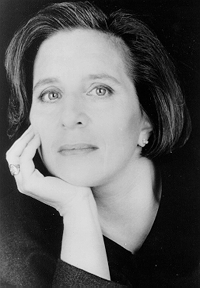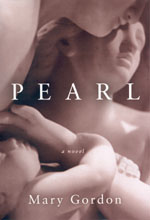 Mary Gordon |
March 9, 2005 (Wednesday) 4:15 p.m. Seminar, HU 354 8:00 p.m. Reading Recital Hall, PAC UAlbany, Uptown Campus  |

 Mary Gordon |
March 9, 2005 (Wednesday) 4:15 p.m. Seminar, HU 354 8:00 p.m. Reading Recital Hall, PAC UAlbany, Uptown Campus  |
Mary Gordon, one of America's most admired prose writers, is the author of several bestselling novels, as well as short stories, memoirs, essays and criticism. Gordon is known for her investigations of Catholic family life, Catholic spirituality, thwarted love, moral struggle, personal sacrifice, female identity, and family pain. She is often praised for her deep insights, lyrical writing, and what "Los Angeles Times" critic Ellen Akins called, "her delicate rendering of the drama of consciousness."
Gordon's latest novel is "Pearl" (2005, ISBN 0-375-42315-X), the story of a strong-willed, middle-aged, single mother named Maria who sets out to prevent her only daughter, Pearl, from killing herself in a self-imposed hunger strike as she sits chained to a flagpole in front of the American embassy in Dublin.
"The Catholic Church, complicated family and class relationships, and current events--mainstays of Gordon's considerable body of work--play out powerfully in this riveting tale of a mother's fierce, unstoppable determination to save her daughter. Gordon's genius with the well-placed detail and the seemingly casual comment quite literally alters the history of her characters and creates an atmosphere of nerve-racking tension that hurts." - The "Library Journal"
Other recent books by Gordon include the biography, "Joan of Arc" (2000); the essay collection, "Seeing Through Places: Reflections on Geography and Identity" (2000); the novel, "Spending: A Utopian Divertimento" (1998); and the bestselling memoir of her secretive, tormented father, "The Shadow Man" (1996).
"Gordon is perfectly matched with Joan of Arc, and the book she has written is both a compelling life story and a shrewd analysis of the mythical uses to which it has been put." - James Carroll, "New York Times Book Review"
Unlike much of Gordon's previous work, the novel "Spending" concerns (in the author's words), "pleasure in its various forms." Writing in the "Nation," reviewer Maureen Corrigan said, "It's as though after all these years of kneeling, resentful but spellbound, in the darkened confessional, Gordon has decided to rend the curtains and treat herself and her readers to a vision of an earthly paradise." Writing in the Catholic cultural journal, "Commonweal," Robert H. Bell called the novel, "immensely engaging, fun, a delightful romp."
Gordon's other acclaimed novels include "The Other Side" (1989), "Men and Angels" (1985), "The Company of Women" (1981), and "Final Payments" (1978).
Mary Gordon has received the Lila Acheson Wallace-Reader's Digest Writer's Award, Guggenheim Fellowship and is the McIntosh Professor of English at Bamard College."It is the most intelligent and convincing first novel I have read in years, one that combines the high moral seriousness of Doris Lessing and the stylistic elegance of Flannery O'Connor." - Critic Edmund White, "Washington Post" review of "Final Payments"
"If there was any doubt that Mary Gordon was her generation's preeminent novelist of Roman Catholic mores and manners� it is dispelled by her new book." - Francine du Plessix Gray, "New York Times" review of "The Company of Women"
"The Shadow Man" tells the story of Gordon's father David, a man she adored who died when she was seven, who was a Jewish convert to Catholicism. But thirty years later, Mary Gordon began to ask who her father really was. In the course of writing the memoir, Gordon discovers that virtually everything her father told her about himself was a lie. She also confronts the ugly fact of his hatred of Jews. In The Shadow Man one of our finest novelists sets out to retrieve her father from the mausoleum of mourning. What she discovers--in libraries, archives, and her own memory--tests her credulity and her forgiveness. She finds an immigrant who lied about his past; a Jew who became a virulent anti-Semite, a writer of devout Catholic poetry who was also a publisher of pornography. Out of these contradictory fragments Gordon constructs a convincing and a compassionate portrait of a lost father and the daughter who kept looking for him. In so doing, Gordon has elevated the memoir into a triumphant an unforgettable work of art. "[Gordon] is truly brilliant and fearless in her ability to look
even when her eyes burn and her heart breaks." - Los Angles Times 


|
| BookShow Interview Pantheon Books |